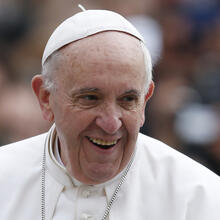Below is the text of Pope Francis’ weekly Wednesday audience, delivered on March 6, 2024.
To receive these remarks and more in your inbox every week, sign up for America’s daily newsletter.
Dear brothers and sisters, good morning!
After having concluded our overview of the vices, it is now time to take a look at the mirror image, which is in opposition to the experience of evil. The human heart can indulge evil passions, it can pay heed to harmful temptations disguised in persuasive garb, but it can also oppose all of this. However arduous this may be, the human being is made for goodness, which truly fulfils him, and is also able to practise this art, causing certain dispositions to become permanent in him or her. Reflection on this wondrous possibility of ours forms a classic chapter in moral philosophy: the chapter of virtue.
The Roman philosophers called it virtus, the Greeks aretè. The Latin term highlights above all that the virtuous person is strong, courageous, capable of discipline and ascesis: therefore, the exercise of the virtues is the fruit of long germination, requiring effort and even suffering. The Greek word, aretè, instead indicates something that excels, something that emerges, that elicits admiration. The virtuous person therefore does not become warped by distortion, but remains faithful to his own vocation, fully realizing himself.
We would be off-course if we thought that the saints were the exceptions of humanity: a sort of restricted circle of champions who live beyond the limits of our species. The saints, from this perspective we have just introduced regarding the virtues, are instead those who become themselves fully, who fulfil the vocation proper to every man or woman. What a happy world it would be if justice, respect, mutual benevolence, broadmindedness, and hope were the shared normality, and not instead a rare anomaly! This is why the chapter on virtuous action, in these dramatic times of ours in which we often have to come to terms with the worst of humanity, should be rediscovered and practised by all. In a distorted world, we must remember the form in which we were shaped, the image of God that is forever imprinted upon us.
But how can we define the concept of virtue? The Catechism of the Catholic Church offers us a precise and concise definition: “A virtue is an habitual and firm disposition to do the good” (no. 1803). Therefore, it is not an improvised or somewhat random good that falls from heaven sporadically. History shows us that even criminals, in moments of lucidity, have performed good deeds; certainly, these deeds are inscribed in the “book of God”, but virtue is something else. It is a goodness that stems from a slow maturation of the person, to the point of becoming an inner characteristic. Virtue is a habitus of freedom. If we are free in every act, and every time we are required to choose between good and evil, virtue is what enables us to have a tendency towards the right choice.
If virtue is such a beautiful gift, a question immediately arises: how is it possible to obtain it? The answer to this question is not simple, it is complex.
For the Christian, the first aid is God’s grace. Indeed, the Holy Spirit acts in us who have been baptized, working in our soul to lead it to a virtuous life. How many Christians have reached holiness through tears, finding they could not overcome some of their weaknesses! But they experienced that God completed that work of good that for them was only a sketch. Grace always precedes our moral commitment.
Moreover, we must never forget the very rich lesson from the wisdom of the ancients, which tells us that virtue grows and can be cultivated. And for this to happen, the first gift to ask of the Spirit is precisely wisdom. The human being is not a free territory for the conquest of pleasures, emotions, instincts, passions, without being able to do anything against these forces, at times chaotic, that dwell within. A priceless gift we possess is open-mindedness, it is the wisdom that can learn from mistakes in order to direct life well. Then, it takes good will: the capacity to choose the good, to form ourselves with ascetic exercise, shunning excesses.
Dear brothers and sisters, this is how we begin our journey through the virtues, in this serene universe that is challenging, but decisive for our happiness.







